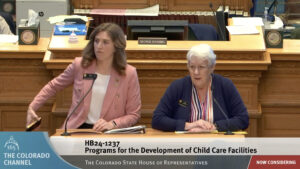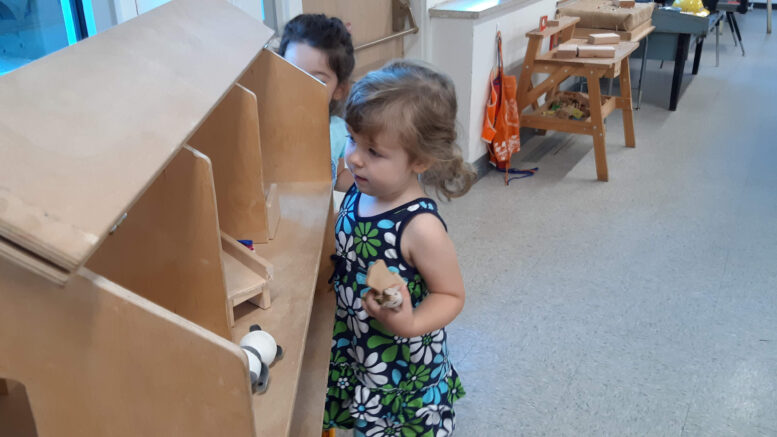If getting workers trained with needed skills is the direct solution to addressing Colorado’s labor shortage, providing workers with tools to be able to maintain a full-time job — like childcare — is a slightly more indirect pathway, albeit one that’s still badly needed.
On Wednesday, Gov. Jared Polis signed the first of three childcare-focused bills to pass the Legislature during the 2024 session — and arguably the one that offers the most wide-ranging efforts to address the state’s severe lack of childcare providers. In fact, Nicole Riehl — president/CEO of EPIC, Executives Partnering to Invest in Children — said House Bill 1237 solidifies Colorado as the first state in America to offer all three of the different types of help that it will dole out to developers, local governments and childcare providers.
The bill establishes three new smaller-dollar grant programs that will supplement a one-time dedication of $115 million that Colorado made with the help of federal grants in 2022 to help train workers for the sector and seed new childcare facilities. The three programs, funded at a combined $250,000 per year for the next five fiscal years, will:
- Offer technical assistance to childcare providers, developers, employers, local governments, public schools and higher-education institutions to help them understand how to develop childcare facilities, including within multi-use projects;
- Provide grants to local governments to upgrade their development regulations in ways that make it easier to open childcare facilities — and require recipients to implement at least one of the suggestions offered by the state; and,
- Establish a grant program, beginning as early as July 2025, to provide matching funds to local governments, public-private partnerships, public schools and higher-ed institutions to construct or retrofit a facility to meet a demonstrated local need for childcare.
Why these childcare changes matter
HB 1237, sponsored by Republican Rep. Mary Bradfield of Fountain and Democratic Rep. Meghan Lukens of Steamboat Springs, got a haircut from the $3.1 million original proposal, though officials can use gifts and donations to help fund the construction grant program. But Riehl said its efforts to educate local governments and builders on how to work together to put highly regulated childcare facilities into developments like multifamily housing projects will eliminate big barriers to increasing early childhood education centers.

Colorado state Reps. Meghan Lukens and Mary Bradfield speak on the House floor in April about their bill to boost childcare facilities.
“Just helping people think about how this happens in communities is going to make a meaningful difference,” Riehl said in an interview shortly before Polis signed HB 1237 into law. “It still leaves a gap in the capital side of most of these projects. But we’ll work on how we can get organized to address that.”
Childcare is an increasing financial burden for Coloradans, with Riehl noting that the average cost of infant care in the state is about $1,800 per month.
Some officials like to point fingers at employers, as Rep. Jennifer Parenti, D-Erie, did during a March 6 House committee hearing on HB 1327 when she said the problem is “primarily caused by businesses failing to pay adequate wages to employees to afford childcare.” But experts of all political stripes agree that the real issue is the lack of providers.
A state full of childcare deserts

Nicole Riehl is president and CEO of childcare-focused business group EPIC.
Riehl estimated that Colorado is 90,000 childcare slots short of being able to meet current needs. Little Den Early Learning Center owner Jennifer Mackety told the same House committee that she is trying to expand because she has 100 students on the wait list to get into her 30-student center. A Bell Policy Center report found that only two of Colorado’s 64 counties have enough childcare slots to meet their needs.
And that shortage is forcing parents — primarily mothers — to remain out of the workforce because they have no one to watch their children, exacerbating skilled-labor shortages that have caused business owners for years to put off expansions that can create more jobs. A national poll released in April by the group Small Business Majority found 59% of small business owners cited a lack of childcare as an impediment to growth and 30% had workers leave because of a lack of childcare.
“I appreciate bills like this that flag that childcare is so important for our workforce,” House Minority Leader Rose Pugliese, R-Colorado Springs, said before the House passed HB 1237 with a modicum of bipartisan support on May 1. “If you leave childcare out of the conversation, I think we are missing a big piece of what we need.”
Two other childcare bills still await Polis’ likely signature.
Streamlining and tax credits
HB 1223, from Democratic Reps. Jenny Willford of Northglenn and Lorena Garcia of Adams County, would change the Child Care Assistance Program to make it easier for low-income parents to get childcare and for providers to participate in the program. It would reimburse providers based on enrollment rather than attendance — thus allowing upfront rather than retroactive payments that can provide operational cash — and streamline applications so parents don’t have to wait weeks to see if they can use the program.
And HB 1312, sponsored by Garcia and Democratic Rep. Emily Sirota of Denver, would create a $1,200 state income-tax credit for anyone making less than $75,000 annually who are operators or employees of childcare centers. Hundreds of thousands of childcare workers nationally have left the sector in the past four years in part because the sector pays such low salaries to keep services affordable, said Lindsey Vigoda, outgoing Colorado director for Small Business Majority.

Lindsey Vigoda is Colorado director for the group Small Business Majority.
Vigoda said the three bills, assuming that they are all signed by Polis, are a good start to eliminating obstacles that keep the childcare sector from expanding to meet needs. Adding funding and cutting red tape for providers will help to grow the industry and reduce the “staggering” number of workers who stay on the sidelines rather than returning to jobs — but more efforts are required, she said.
“It makes a difference. It doesn’t make enough of a difference,” Vigoda told The Sum & Substance on Wednesday. “Until we as a state figure out how to compensate our providers and make this a field that people want to enter, we are going to continue to see people leaving the field.”
